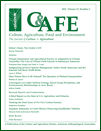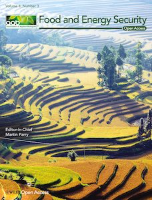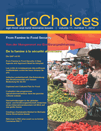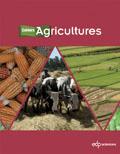
Culture Agriculture Food and Environment
Scope & Guideline
Exploring the Intersections of Culture, Agriculture, and Sustainability
Introduction
Aims and Scopes
- Interdisciplinary Research on Food Systems:
The journal emphasizes research that crosses disciplinary boundaries, integrating insights from anthropology, sociology, geography, and environmental studies to understand complex food systems. - Sustainability and Environmental Justice:
A core focus is on sustainability practices in agriculture, examining how environmental justice intersects with food production and consumption. - Cultural Perspectives on Agriculture:
The journal explores how cultural practices and beliefs shape agricultural methods and food consumption, highlighting the importance of local knowledge and traditional practices. - Rural Innovation and Community Engagement:
Research that investigates community-driven agricultural innovations and the role of local stakeholders in transforming food systems is a significant area of interest. - Impact of Globalization on Local Food Practices:
The journal addresses how global economic and social changes affect local food systems and agricultural practices, contributing to discussions on food sovereignty and security.
Trending and Emerging
- Digital Agriculture and Technology Integration:
There is a growing emphasis on how digital tools and technologies are reshaping agricultural practices, particularly in the context of the COVID-19 pandemic and its aftermath. - Food Sovereignty and Justice Movements:
Increasing attention is being paid to food sovereignty movements, particularly in relation to racial and social justice, highlighting the intersection of food access and community empowerment. - Ecological and Indigenous Knowledge Systems:
Research that integrates indigenous ecologies and knowledge systems into contemporary agricultural practices is on the rise, emphasizing sustainable land management and biodiversity. - Resilience in Food Systems:
Emerging themes focus on resilience strategies in food systems, particularly in response to crises such as the COVID-19 pandemic, exploring how communities adapt and innovate. - Rural Innovation and Social Entrepreneurship:
There is an increasing interest in rural innovation and social entrepreneurship, underscoring the role of local communities in driving sustainable agricultural practices and economic development.
Declining or Waning
- Traditional Agricultural Practices:
Research specifically focused on traditional farming methods has decreased, possibly as attention shifts towards more innovative and sustainable practices in agriculture. - Industrial Agriculture Critique:
Discussion surrounding the critique of industrial agriculture seems to have lessened, as the focus now often leans more towards solutions and adaptations rather than solely critiques. - Homogeneity in Food Systems:
The exploration of homogeneity in global food systems has waned, with a greater emphasis now placed on diversity and resilience in local food practices. - Historical Agricultural Studies:
There appears to be a decline in studies that focus solely on historical perspectives of agriculture, as current trends favor contemporary issues and future-oriented research. - Narrow Economic Analyses:
Research that analyzes agricultural practices solely from an economic standpoint is becoming less frequent, as the journal increasingly prioritizes socio-cultural and environmental dimensions.
Similar Journals

Food and Energy Security
Exploring the Nexus of Agriculture and Energy for a Sustainable TomorrowFood and Energy Security, an esteemed journal published by WILEY, is dedicated to advancing the fields of food science, agriculture, and renewable energy. Since its inception in 2012, this open-access journal has provided a platform for groundbreaking research and innovative practices that address global challenges related to food production and energy sustainability. With an impressive impact factor reflected in its Q1 quartile rankings across notable categories such as Agronomy and Crop Science and Food Science, this journal is instrumental for researchers and practitioners alike who are focused on enhancing food security and promoting sustainable energy solutions. The journal's scope encompasses multidisciplinary approaches and encourages submissions that explore the intersection of food systems and energy dynamics, ensuring relevance in the evolving landscape of environmental science and policy. By offering open access to its publications, Food and Energy Security commits to making vital research accessible, fostering informed dialogue and collaboration among scholars, policymakers, and the agrifood industry worldwide.

Studies in Agricultural Economics
Fostering Collaboration for a Sustainable FutureStudies in Agricultural Economics is a premier journal published by AGRARGAZDASAGI KUTATO & INFORMATIKAI INTEZET in Hungary, focusing on innovative research in the interdisciplinary fields of agricultural, biological, and economic sciences. Since becoming an Open Access journal in 1997, it has aimed to enhance the visibility of agricultural economics scholarship while promoting global engagement among researchers, practitioners, and policymakers. With its robust Q2 and Q3 rankings across varied categories including Development and Geography, this journal serves as a significant platform for disseminating cutting-edge studies that address crucial issues in agriculture and rural development. The journal's continuous publication since 2011 until 2024 exemplifies its commitment to providing timely insights into evolving agricultural challenges. With a strong Scopus ranking across multiple domains, particularly in the social sciences and agricultural sectors, it stands as a vital resource for anyone looking to advance knowledge and practice in these critical areas.

EuroChoices
Exploring the intersection of economics and geography.EuroChoices, published by WILEY, is a leading journal in the fields of economics and geography, demonstrating a significant impact as evidenced by its exceptional rankings—Q1 in both Economics, Econometrics and Finance and Geography, Planning and Development for 2023. With an ISSN of 1478-0917 and an E-ISSN of 1746-692X, this esteemed journal has been a pivotal platform for scholarly discourse since its inception in 2003, evolving thoughtfully to encompass contemporary issues and trends through 2024. Situated in the United States, it serves as an essential resource for researchers, professionals, and students alike, offering insights that bridge economic theories with geographical perspectives. While it maintains a traditional publishing approach without open access options, the journal continues to thrive, achieving high ranks in Scopus—with Economics positioned 37th out of 242 and Geography at 151st out of 821—highlighting its role as a critical contributor to the academic community.

Food Security
Connecting Science and Policy for Sustainable Food SystemsFood Security is a premier academic journal dedicated to advancing knowledge and fostering dialogue surrounding the critical issues of food security and sustainability in a rapidly changing world. Published by Springer, this journal has established itself as a leading voice in the fields of Agronomy, Crop Science, Development, and Food Science, reflected in its impressive Q1 quartile rankings across these disciplines for 2023. With an impact factor showcasing its significant influence, Food Security is ranked in the top echelon of its domain, with notable positions in Scopus indices (Rank #7 in Agronomy and Crop Science, Rank #6 in Development, and Rank #13 in Food Science). Spanning articles from 2010 to 2024, the journal serves as a critical resource for researchers, professionals, and students seeking to address the complex interplay of agricultural practices, socio-economic dynamics, and environmental factors that contribute to food availability and accessibility on a global scale. While primarily subscription-based, Food Security ensures that its audience remains engaged with the latest research, policy discussions, and innovative solutions to combat food insecurity worldwide.

Scientific Papers-Series Management Economic Engineering in Agriculture and Rural Development
Catalyzing Change in Rural Development through Economic EngineeringScientific Papers-Series Management Economic Engineering in Agriculture and Rural Development is a premier open access journal dedicated to advancing the field of agricultural and rural development management. Published by the University of Agronomic Sciences and Veterinary Medicine Bucharest, this journal has been a valuable resource for researchers, practitioners, and students since its inception in 2009. With a focus on the integration of economic engineering principles into agricultural practices, the journal aims to provide innovative solutions and insights that address contemporary challenges in rural development. While the journal's H-index and specific Scopus rankings are not listed, its open access format ensures that cutting-edge research is readily available to a global audience, facilitating engagement and collaboration across disciplines. Located in the heart of Romania, the journal serves as a critical platform for disseminating impactful research and fostering dialogue in the ever-evolving landscape of agriculture and rural development.

AGRICULTURAL HISTORY
Harvesting Insights from Agricultural HistoryAGRICULTURAL HISTORY, published by DUKE UNIVERSITY PRESS, is a prominent academic journal that has been a vital resource in the fields of agricultural sciences and historical studies since its inception in 1975. With an ISSN of 0002-1482 and E-ISSN of 1533-8290, this journal holds an impressive reputation reflected in its SCImago rankings: it ranks in the Q2 quartile in Agricultural and Biological Sciences (miscellaneous) and Q1 in History, highlighting its relevance and scholarly impact. The journal serves as a platform for groundbreaking research that explores the intricate relationships between agriculture and society throughout history. Though not an open access journal, the content is widely regarded for its rigor and depth, appealing to researchers, professionals, and students interested in understanding the role of agriculture in shaping historical narratives and contemporary issues. The journal remains committed to advancing knowledge within its scope while fostering critical discourse across disciplines.

JOURNAL OF AGRICULTURAL & ENVIRONMENTAL ETHICS
Illuminating the Ethical Dimensions of Farming and NatureJOURNAL OF AGRICULTURAL & ENVIRONMENTAL ETHICS, published by SPRINGER, is a leading interdisciplinary journal dedicated to exploring the complex relationships between agriculture, the environment, and ethical considerations. With an ISSN of 1187-7863 and an E-ISSN of 1573-322X, this journal holds a prestigious position in various categories, achieving Q1 rankings in Agricultural and Biological Sciences and History, demonstrating its influence with a Scopus rank of 17th out of 1760 in the domain of Arts and Humanities. The journal aims to provide a comprehensive platform for scholars and practitioners to engage in critical discussions surrounding ethical frameworks affecting agricultural practices and environmental stewardship. Offering a publication window from 1991 to 2024, the journal contributes significantly to both theoretical and practical advances in its field, facilitating access to essential insights that benefit researchers, professionals, and students alike. Situated in the Netherlands, the journal adheres to high academic standards while addressing pertinent global issues.

Agricultura Sociedad y Desarrollo
Exploring the Nexus of Agriculture and Social ProgressAgricultura Sociedad y Desarrollo is a renowned journal published by COLEGIO POSTGRADUADOS, focusing on the intricate relationship between agriculture, society, and sustainable development. With an ISSN of 1870-5472 and an E-ISSN of 2594-0244, this journal plays a critical role in disseminating cutting-edge research and practical insights essential for advancing agricultural sciences and fostering community resilience. Although Agricultura Sociedad y Desarrollo is not open access, its commitment to quality ensures that the materials published meet rigorous academic standards, promoting innovation and collaboration among researchers, policymakers, and practitioners. Positioned in the heart of Mexico, the journal highlights regional agricultural challenges while contributing to global discussions on sustainable development. With the growing emphasis on integrating social sciences in agriculture, this journal stands out as a vital source of knowledge and discussion for those keen on enhancing agricultural practices and societal development.

CAHIERS AGRICULTURES
Championing open access to vital agricultural insights.CAHIERS AGRICULTURES is a distinguished open-access journal published by EDP Sciences S A, focusing on the vital fields of Agronomy and Crop Science, Animal Science and Zoology, as well as Management, Monitoring, Policy, and Law. With an ISSN of 1166-7699 and an E-ISSN of 1777-5949, this journal has notably maintained a strong presence in the academic landscape since its establishment, covering a wide range of topics pertinent to agricultural sciences. Based in France, CAHIERS AGRICULTURES fosters collaboration and knowledge sharing among researchers and practitioners through its open-access model, which has been in effect since 2014. The journal is recognized for its rigorous peer-review process, reflected in its competitive Scopus rankings, which place it in the Q2 quartile for both Agronomy and Crop Science, and Animal Science and Zoology. Researchers and scholars are encouraged to contribute cutting-edge findings that may influence agricultural practices and policy development. With a vision to advance sustainable agricultural practices, CAHIERS AGRICULTURES stands as a critical resource for advancing scientific knowledge and informing stakeholders in the agricultural sector.

Food Culture & Society
Unpacking the Cultural Significance of Culinary PracticesFood Culture & Society is an esteemed journal dedicated to the multifaceted analysis of food, culture, and social practices, published by Routledge Journals, Taylor & Francis Ltd in the United Kingdom. With an ISSN of 1552-8014 and an E-ISSN of 1751-7443, this journal offers a rigorous platform for interdisciplinary research, engaging scholars and practitioners alike. Renowned for its high impact factor and categorized in the Q1 quartile in Cultural Studies, it has firmly established itself as a pivotal publication in the study of food through cultural and social lenses. Additionally, it ranks #140 in Cultural Studies according to Scopus, reflecting its critical role in advancing knowledge in this field. The journal emphasizes the importance of food as a cultural artifact and a site for social inquiry, inviting contributions that explore themes ranging from food systems and sustainability to identity and globalization. As it converges from 2008 to 2024, Food Culture & Society stands at the forefront of scholarly discourse, catering to a diverse audience of researchers, students, and professionals committed to understanding the vital connections between food and society.